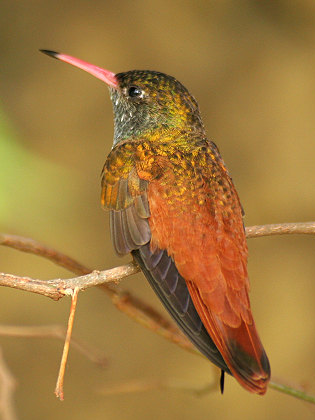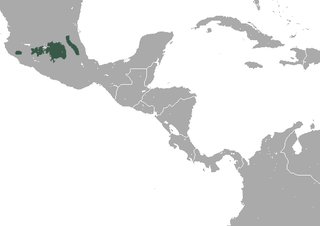
The Arvicolinae are a subfamily of rodents that includes the voles, lemmings, and muskrats. They are most closely related to the other subfamilies in the Cricetidae. Some authorities place the subfamily Arvicolinae in the family Muridae along with all other members of the superfamily Muroidea. Some refer to the subfamily as the Microtinae or rank the taxon as a full family, the Arvicolidae.

The amazilia hummingbird is a hummingbird in the "emeralds", tribe Trochilini of subfamily Trochilinae. It is the only species placed in the genus Amazilis. It is found in Ecuador and Peru. Its six subspecies differ primarily in their throat and belly colors.
The white-tailed mountain vole is a species of vole in the family Cricetidae. It is found in India and Pakistan.

Alticola is a genus of rodent in the family Cricetidae.
The Gobi Altai mountain vole is a species of rodent in the family Cricetidae. It can be found in China, Mongolia, and the Russian Federation.
The lemming vole is a species of rodent in the family Cricetidae. It is found only in the Russian Federation.
The large-eared vole is a species of rodent in the family Cricetidae. It is found in Mongolia and the Russian Federation.
The Mongolian silver vole, also called the Mongolian mountain vole, is a species of rodent in the family Cricetidae. It is found mostly in Mongolia and small parts of southern Russia and northeastern China.

Stolička's or Stoliczka's mountain vole is a species of rodent in the family Cricetidae. It is found in China, Pakistan, India and Nepal.
The flat-headed vole, also called the flat-headed mountain vole or Strelzov's mountain vole, is a species of rodent in the family Cricetidae. It is found in China, Kazakhstan, Mongolia, and Russian Federation.
The Tuva silver vole is a species of rodent in the family Cricetidae. It is found in Mongolia and Russian Federation.
The Tibetan dwarf hamster is a species of rodent in the family Cricetidae. It is found not only in Tibet and China, but also in India and Nepal in mountainous regions at altitudes of up to about 5,200 m (17,100 ft).

The mitred parakeet, also known as the mitred conure in aviculture, is a species of bird in subfamily Arinae of the family Psittacidae, the African and New World parrots. It is native to Argentina, Bolivia, and Peru. It has been introduced to Uruguay and is established there. There are also substantial populations in the US states of California and Florida and smaller numbers in Hawaii.

Royle's pika, also called the Himalayan mouse hare or hui shutu, is a species of pika. It is found in Bhutan, China, India, Nepal, and Pakistan.
The Clethrionomyini are a tribe of forest voles in the subfamily Arvicolinae. This tribe was formerly known as Myodini, but when genus Myodes was deemed to be a junior synonym, the tribe was renamed. Species in this tribe are:

The Central Mexican broad-clawed shrew is a species of mammal in the family Soricidae. It is found in the highlands above 2000 m in the Mexican states of Colima, Hidalgo, Jalisco, Michoacán, Mexico, and Puebla, Morelos, and in the Mexican Federal District
The Lake Baikal mountain vole or Olkhon mountain vole is a species of rodent in the family Cricetidae. It is found principally on the Olkhon and Ogoi islands on Lake Baikal, in southern Siberia. It is also found in a small part of the bordering mainland Russia, on the Baikal coast of the Irkutsk Oblast. It was originally described as a subspecies of the silver mountain vole. Since then, it has been synonymized with A. roylei in 1978, A. tuvinicus, and A. macrotis before reinstating it as a species. It is likely a sister species to A. tuvinicus.






